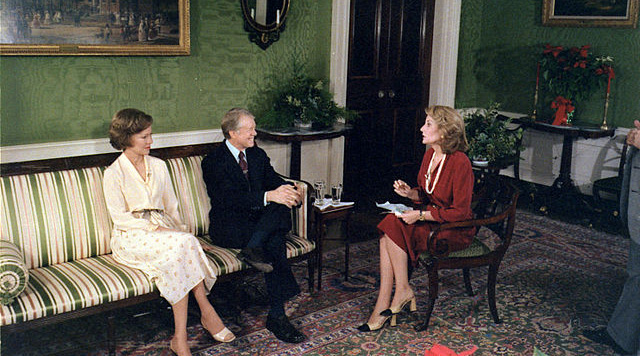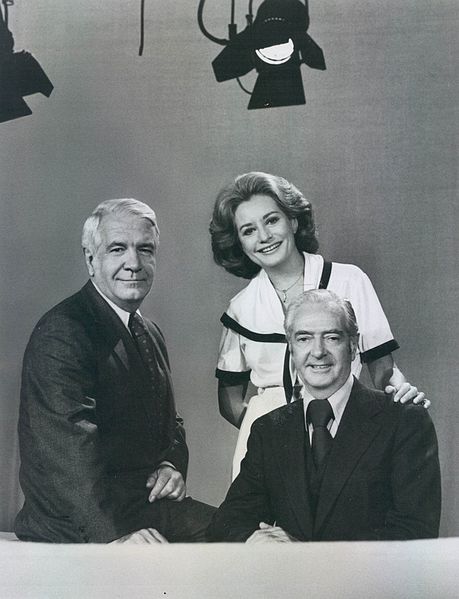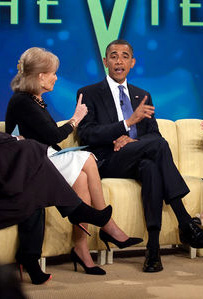
Barbara Walters has been on television my entire life. Actually, she's been on a lot longer than that, but my point is that I never had to live in a Nielsen world without her gentle, rounded R's soothing me through a national crisis. Come this time next year, I'll have to adjust. After weeks of speculation the news veteran, who has interviewed everyone from Sadat to Putin (and the most watched interview of all time, with former White House intern Monica Lewinsky), announced her plans to retire from television in 2014 on her show The View. Walters, 83, stressed that her retirement had nothing to do with her health (she's had heart surgery and a recent bout of dangerous adult chicken pox in the last year) and that the decision was hers.
There are all kinds of reasons we'll miss Barbara Walters on television and perhaps all kinds of reasons we won't but there are two undeniable facts her retirement forces us to confront. First, Walters is among the last journalistic ties we have to the pioneering, early days of television news that's still on the air: Murrow, Brinkley and Cronkite were the power players when Walters made a place for herself in the male dominated world of television news fifty years ago. More importantly, looking at the landscape of television and women in media the world seems to exist in a BBW and ABW context: Before Barbara Walters and After Barbara Walters. Before Barbara Walters women on television news were weather girls, gal Fridays and mostly ran second to their male anchors. After Barbara Walters, women are (more) equal participants in how the news is made and reported.

It will be said many times in the next year as ABC plans retrospectives, celebrations and countless "best of" specials but Barbara Walters opened the doors to the then boys-only club of television news, and while she was squeezing through whatever opening she could make for herself, other women followed. The stories of her triumphs over a system stacked against her are legendary and seem absurd now in their antiquated misogyny. When she first arrived on NBC's Today Show in the 1960s, women on the program were still referred to as "Today Girls." But by the time Walters left for ABC in the late '70s they were co-hosts, a first for any woman on the network. When Walter's left NBC to co-anchor the ABC Evening News (another first, one that Walters is often overlooked for in favor of Katie Couric's solo hosting duties on CBS three decades later) she had a notoriously poor relationship with co-anchor Harry Reasoner, one for the time and the place it's fair to say was colored by sexist resentment.
Even the often-parodied, frequently SNL-spoofed and cause of occasional personal hand-banging against the wall that is The View was a significant first: a show created by Walters for women and by women (remember her first season voice over? "I've always wanted to do a show with women of different generations, backgrounds and views: well, be careful what you wish for..."). Then there are her journalistic "gets:" sitting presidents, movie stars, legendary artists, foreign heads of state, spiritual leaders, embattled celebrities in every field ready to confess their sins on 20/20. Walters practically invented the on air confession as a necessary step in public redemption: I'll feel a twinge when the first politician gets caught cheating on his wife after Walters retires and he's forced to confess details to... oh God, it hurts me to say this, Piers Morgan.

If Murrow, Cronkite and Brinkley once calmed America in times of crisis with a paternal air of authority in her career Walters developed, if not exactly a maternal presentation during the breaking stories of our times, a very female one that was as key to our stability as viewers as the contributions of any male anchor. I always thought of Walters a sort of no-nonsense, old moneyed aunt: you had to be on your best behavior with her but if you were clever and worthy of it, she'd warm up during an interview and maybe reward you with a few laughs. When Princess Diana died in 1997, my family was watching the news coverage with Walters: in a moment that defined for me her special kind of human interest reporting she asked one of her co-anchors if there had been any word from Buckingham Palace about Diana's young sons, who were on holiday in Scotland at the time of the crash. Maybe earlier in her career Walters had to fight for and insist on her authority but as the landscape of television changed, she was able to take a role as elder stateswoman: in the trenches when she needed to be, waiting for the big interviews to come to her and, by creating shows like The View (and inspiring its imitators) continuing to make opportunities for the women that would follow her and one day take her place.

